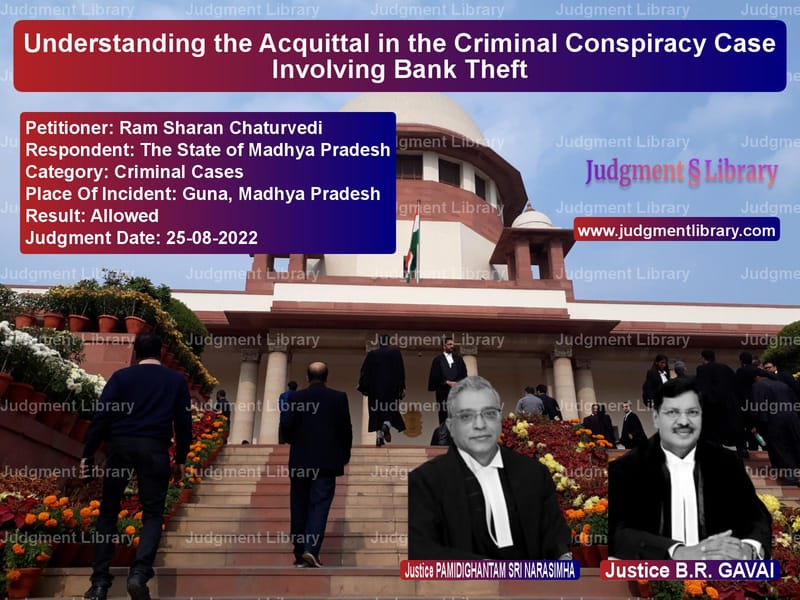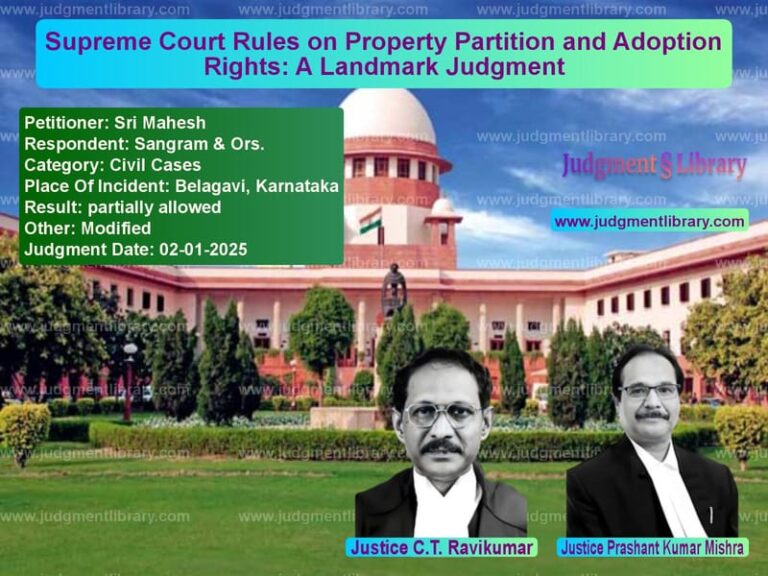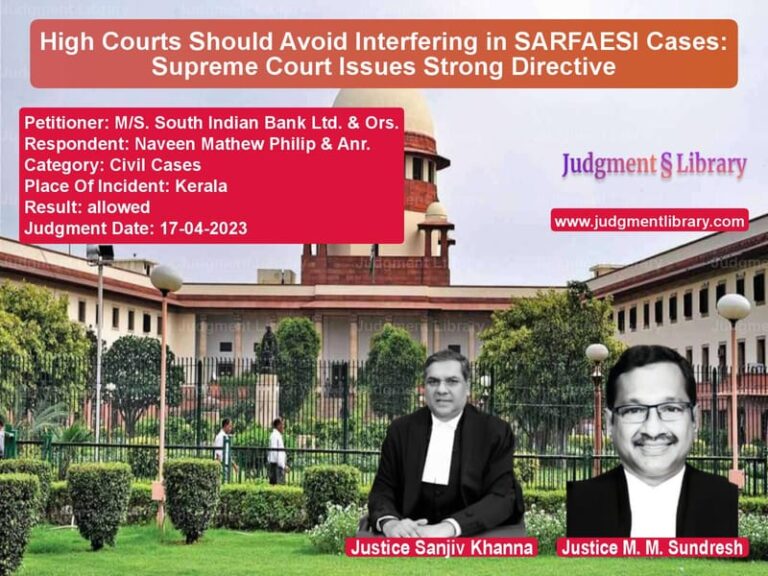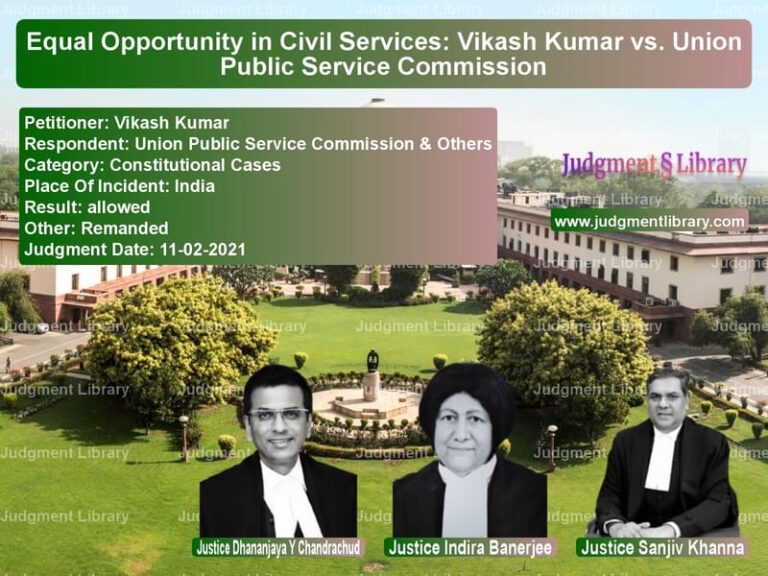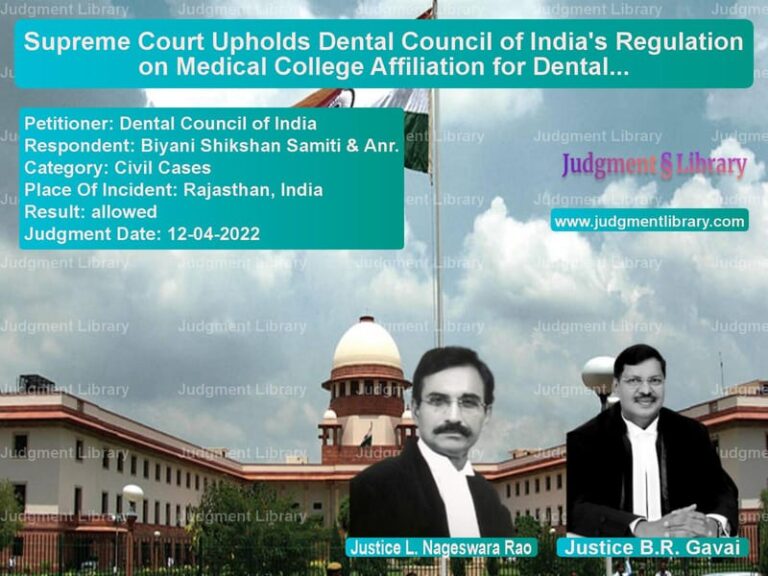Understanding the Acquittal in the Criminal Conspiracy Case Involving Bank Theft
The Supreme Court of India, in its judgment dated August 25, 2022, dealt with the appeal of Ram Sharan Chaturvedi, an accused in a high-profile case concerning a bank theft in Guna, Madhya Pradesh. The appellant, who was convicted by the Trial Court and the High Court for offences under Sections 201, 380, 435, 457, 477 read with Section 120B of the Indian Penal Code (IPC), challenged his conviction and sentence on the grounds of insufficient evidence. This post explores the arguments, the Court’s analysis, and the final outcome of the case, which ultimately led to the acquittal of the appellant.
Background of the Case
The case revolves around a theft that took place at the Guna branch of the Central Bank of India. A significant amount of money was stolen from the bank’s safe and destroyed with petrol, causing substantial damage. Ram Sharan Chaturvedi, the appellant, was employed as the Head Cashier and had access to one of the keys to the dual-locking system used to secure the bank’s strong room. The prosecution’s case was that he conspired with other accused to facilitate the theft. The appellant was charged with being a part of the conspiracy under Section 120B of the IPC, as well as other charges related to theft, house-trespass, and destruction of valuable security.
Read also: https://judgmentlibrary.com/supreme-court-upholds-mcoca-charges-in-mumbai-matka-gambling-case/
The Petitioner’s Arguments
The appellant’s defense was primarily based on challenging the existence of any criminal conspiracy. He argued that there was no direct evidence linking him to the crime or proving that he had a role in facilitating the theft. His counsel, Ms. S. Janani, argued that the stolen amount had been recovered and that there was no loss to the bank, which she claimed should exonerate him of the theft charges. She further argued that the evidence presented did not support the assertion of conspiracy, as there was no physical manifestation of any agreement between the appellant and the other accused to commit the crime.
The Respondent’s Arguments
The State, represented by Shri Pashupathi Nath Razdan, contended that both the Trial Court and the High Court had correctly found that the appellant’s exclusive possession of one set of keys to the bank’s strong room and safe was sufficient to conclude his involvement in the conspiracy. The prosecution argued that, despite the lack of direct evidence of the appellant’s active involvement in the theft, his position as the custodian of the keys provided him the opportunity to facilitate the crime. Furthermore, the prosecution relied on circumstantial evidence, including the testimony of bank employees and the recovery of stolen property from the other accused.
The Court’s Analysis
The Supreme Court carefully analyzed the charge of conspiracy under Section 120B of the IPC. The Court observed that the key element in establishing a conspiracy was the existence of an agreement between the accused to commit an illegal act. The Court noted that while the appellant held one of the keys, there was no conclusive evidence of an agreement between him and the other accused, A-1 and A-2, to carry out the theft.
The Court referred to several precedents, including the case of State of Kerala v. P. Sugathan, which emphasized that for a conspiracy charge, there must be a clear physical manifestation of an agreement. The Court also cited the case of State (NCT of Delhi) v. Navjot Sandhu, which outlined the need to assess the cumulative effect of the circumstances to infer conspiracy. However, in the appellant’s case, the Court found that the prosecution failed to establish any direct or circumstantial evidence showing an agreement between the appellant and the other accused. The appellant’s possession of the key alone was not sufficient to establish that he had conspired with the others.
The Judgment
The Supreme Court, after reviewing the evidence, concluded that the appellant’s conviction for criminal conspiracy under Section 120B of the IPC could not be sustained. The Court found that the prosecution had failed to prove the existence of any agreement or common design between the appellant and the other accused. As a result, the Court allowed the appellant’s appeal, quashed the judgments of the High Court and the Trial Court, and acquitted the appellant of all charges.
Conclusion
This case underscores the importance of solid evidence, particularly in conspiracy cases, where the prosecution must prove the existence of an agreement or concerted action. While the appellant’s access to the keys and his presence at the scene of the crime were incriminating, the lack of direct evidence of conspiracy led the Supreme Court to acquit him. This judgment serves as a reminder that in criminal cases, particularly those based on circumstantial evidence, the burden of proof lies heavily on the prosecution to establish a clear and irrefutable link between the accused and the crime.
Petitioner Name: Ram Sharan Chaturvedi.Respondent Name: The State of Madhya Pradesh.Judgment By: Justice PAMIDIGHANTAM SRI NARASIMHA, Justice B.R. GAVAI.Place Of Incident: Guna, Madhya Pradesh.Judgment Date: 25-08-2022.
Don’t miss out on the full details! Download the complete judgment in PDF format below and gain valuable insights instantly!
Download Judgment: ram-sharan-chaturved-vs-the-state-of-madhya-supreme-court-of-india-judgment-dated-25-08-2022.pdf
Directly Download Judgment: Directly download this Judgment
See all petitions in Murder Cases
See all petitions in Bail and Anticipatory Bail
See all petitions in Fraud and Forgery
See all petitions in Theft and Robbery Cases
See all petitions in Custodial Deaths and Police Misconduct
See all petitions in Judgment by P.S. Narasimha
See all petitions in Judgment by B R Gavai
See all petitions in allowed
See all petitions in supreme court of India judgments August 2022
See all petitions in 2022 judgments
See all posts in Criminal Cases Category
See all allowed petitions in Criminal Cases Category
See all Dismissed petitions in Criminal Cases Category
See all partially allowed petitions in Criminal Cases Category

